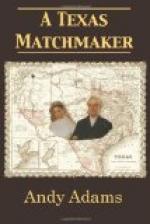“Well, Henry,” said Uncle Lance, rather firmly, “if you are not satisfied, I suppose I’ll have to open the bales for you, but before I do, I’m going to send after June. Neither you nor any one else can cast any reflections on a man in my employ. No unjust act can be charged in my presence against an absent man. The vaqueros tell me that my foreman is only around the bend of the river, and I’m going to ask all you gentlemen to remain until I can send for him.”
John Cotton was dispatched after Deweese. Conversation meanwhile became polite and changed to other subjects. Those of us at work baling hides went ahead as if nothing unusual was on the tapis. The visitors were all armed, which was nothing unusual, for the wearing of six-shooters was as common as the wearing of hoots. During the interim, several level-headed visitors took Henry Annear to one side, evidently to reason with him and urge an apology, for they could readily see that Uncle Lance was justly offended. But it seemed that Annear would listen to no one, and while they were yet conversing among themselves, John Cotton and our foreman galloped around the bend of the river and rode up to the yard. No doubt Cotton had explained the situation, but as they dismounted Uncle Lance stepped between his foreman and Annear, saying:—
“June, Henry, here, questions the honesty of your list of strays killed, and insists on our cutting the bales for his inspection.” Turning to Annear, Uncle Lance inquired, “Do you still insist on opening the bales?”
“Yes, sir, I do.”
Deweese stepped to one side of his employer, saying to Annear: “You offer to cut a bale here to-day, and I’ll cut your heart out. Behind my back, you questioned my word. Question it to my face, you dirty sneak.”




